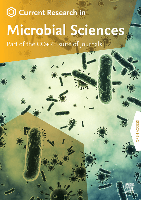
Current Research in Microbial Sciences
Scope & Guideline
Connecting Researchers with Cutting-edge Microbial Discoveries
Introduction
Aims and Scopes
- Microbial Ecology and Interactions:
Research exploring the relationships between microorganisms and their environments, including plant-microbe interactions, microbial community dynamics, and the role of microbes in ecosystem functioning. - Biotechnology and Bioengineering:
Innovative studies on the use of microbes for biotechnological applications, including bioremediation, biofuel production, and the development of microbial biofertilizers and biopesticides. - Pathogen Biology and Host Interactions:
Investigations into the mechanisms of microbial pathogenesis, host immune responses, and the development of antimicrobial agents and vaccines. - Sustainable Agriculture:
Research aimed at enhancing agricultural practices through the application of microbial technologies, focusing on soil health, plant growth promotion, and waste valorization. - Antimicrobial Resistance:
Studies addressing the emergence and dissemination of antimicrobial resistance genes in microbial populations, their implications for public health, and strategies to mitigate resistance. - Environmental Microbiology:
Research on the role of microbes in environmental processes, including waste treatment, nutrient cycling, and the impact of anthropogenic activities on microbial communities.
Trending and Emerging
- Microbial Biocontrol and Biofertilization:
There is a growing emphasis on the use of beneficial microbes for sustainable agriculture, including the development of biofertilizers and biopesticides that enhance crop productivity while minimizing environmental impact. - Microbial Metabolites and Natural Products:
Research into the bioactive compounds produced by microbes, such as antimicrobial peptides and secondary metabolites, is trending as these compounds offer potential alternatives to traditional pharmaceuticals. - Microbiome Research in Agriculture and Health:
An increasing focus on the role of microbial communities in both agricultural systems and human health, including the impact of the microbiome on plant growth and disease resistance as well as human health outcomes. - Climate Change and Microbial Responses:
Studies examining how climate change affects microbial communities and their functions are emerging, reflecting the need to understand microbial resilience in changing environments. - Innovative Bioremediation Strategies:
Research on cutting-edge bioremediation techniques utilizing microbes to degrade environmental pollutants is gaining traction, particularly in addressing challenges related to plastic waste and heavy metal contamination.
Declining or Waning
- Traditional Antibiotic Studies:
Research focused solely on traditional antibiotics and their mechanisms of action has decreased as the field shifts towards exploring alternative therapies, such as bacteriophage therapy and novel antimicrobial agents. - Basic Microbial Taxonomy:
Studies that primarily focus on the classification and identification of microbial species without exploring their functional roles or applications are becoming less common. - Single Microbe Studies:
Research concentrating on individual microbial species is waning in favor of more integrative approaches that examine microbial communities and their interactions within ecosystems. - Conventional Laboratory Techniques:
The reliance on traditional microbiological techniques for studying microbial behavior is declining as advanced molecular techniques and bioinformatics tools gain prominence. - Human Microbiome Studies:
While still relevant, the volume of studies focusing exclusively on the human microbiome is decreasing as the field broadens to include environmental and agricultural microbiomes.
Similar Journals

CANADIAN JOURNAL OF MICROBIOLOGY
Bridging Disciplines in Microbiology and BeyondThe Canadian Journal of Microbiology, published by Canadian Science Publishing, is a well-respected journal established in 1954 that serves as a vital platform for advancing knowledge in the fields of microbiology and related disciplines. With an ISSN of 0008-4166 and an E-ISSN of 1480-3275, this journal is recognized for its rigorous peer-review process and its commitment to disseminating high-quality research that spans applied microbiology, biotechnology, genetics, immunology, and more. Currently indexed in several prestigious databases, its impact factor and category quartiles highlight its significance, ranking in the top tiers of applied microbiology and biotechnology as well as other intersecting fields. The journal provides an essential resource for researchers, professionals, and students seeking to stay informed on the latest advancements and breakthroughs, facilitating collaboration and innovation in the microbiological sciences. Set in the dynamic landscape of academia from its headquarters in Ottawa, Canada, the Canadian Journal of Microbiology remains steadfast in its mission to promote research that addresses key challenges and opportunities within the microbiological community.

ARCHIVES OF MICROBIOLOGY
Pioneering Insights in Microbiology Since 1974The Archives of Microbiology, published by Springer, is a reputable journal in the field of microbiology, serving as a vital platform for the dissemination of groundbreaking research and critical reviews since its inception in 1974. With an ISSN of 0302-8933 and an E-ISSN of 1432-072X, this journal operates out of Germany and maintains a global reach, promoting high-quality scholarship across multiple disciplines, including biochemistry, genetics, and molecular biology, as evidenced by its Q2 ranking in Medicine (miscellaneous) and consistent Q3 placements in other categories in 2023. Although the journal does not offer open access options, its rigorous peer-review process ensures that published articles are of the highest standard, making it an essential resource for researchers, professionals, and students keen on advancing their understanding of microbial sciences. As the journal converges toward 2024, it remains committed to fostering innovative microbiological research and facilitating interdisciplinary dialogue within the scientific community.

AIMS Microbiology
Championing high-quality research in the realm of microbes.AIMS Microbiology, published by the American Institute of Mathematical Sciences (AIMS), is an esteemed Open Access journal dedicated to advancing the field of microbiology since its inception in 2015. With an ISSN of 2471-1888, the journal aims to disseminate high-quality research and innovative findings pertaining to both fundamental and applied microbiology, encompassing areas such as medical microbiology, immunology, and related life sciences. Recognized for its academic rigor, AIMS Microbiology has achieved a significant standing, evidenced by its current Q2 ranking in both Microbiology and Medical Microbiology categories, along with impressive percentile rankings within prestigious Scopus metrics. Based in the United States, the journal not only emphasizes accessibility and widespread dissemination of knowledge but also plays a crucial role in fostering collaboration among researchers and professionals in the microbiological sciences. By providing a platform for collaborative research and innovative ideas, AIMS Microbiology is poised to influence the future development and application of microbiological research, making it a valuable resource for students, researchers, and practitioners alike.
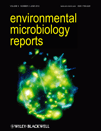
Environmental Microbiology Reports
Connecting Microbial Insights to Environmental SustainabilityEnvironmental Microbiology Reports, published by WILEY, is a prestigious journal dedicated to the field of environmental microbiology, exploring the intricate interactions between microorganisms and their environments. With an ISSN of 1758-2229, this journal has established itself as a crucial resource for researchers, professionals, and students interested in the latest advancements and applications in microbial ecology, soil science, and environmental sustainability. Since its inception in 2009, the journal has grown in impact and reputation, proudly ranked in the Q1 category for both Agricultural and Biological Sciences and Ecology, Evolution, Behavior and Systematics as of 2023. Notably, it occupies the 17th position out of 193 in its subcategory based on Scopus rankings, showcasing its significance within the field. Although it does not currently offer open access options, the high-quality research published in this journal continues to contribute significantly to the understanding of microbial roles in environmental processes, emphasizing the vital role of microbes in maintaining ecosystem health and promoting sustainable practices.
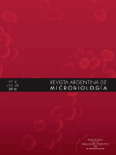
REVISTA ARGENTINA DE MICROBIOLOGIA
Exploring the frontiers of microbiology and medicine since 1979.REVISTA ARGENTINA DE MICROBIOLOGIA, published by the ASOCIACION ARGENTINA MICROBIOLOGIA, stands as a prominent open-access journal in the field of microbiology and medicine since its establishment in 1979. With an ISSN of 0325-7541 and an E-ISSN of 1851-7617, this journal has paved the way for disseminating high-quality research while enhancing accessibility for academics and practitioners worldwide. The journal has achieved notable rankings, being classified in Q3 for Medicine (miscellaneous) and Q3 for Medical Microbiology in 2023, reflecting its commitment to advancing knowledge in these critical areas. Despite its relatively modest impact factors, it occupies a vital niche in the academic landscape, fostering collaborations and innovative research among experts. With Open Access available since 2013, REVISTA ARGENTINA DE MICROBIOLOGIA not only facilitates widespread distribution of valuable scientific information but also empowers researchers, professionals, and students to stay abreast of the latest findings and developments in microbiology. For those engaged in the evolving realm of microbiology, this journal serves as an essential resource for sharing insights and advancing the scientific community.
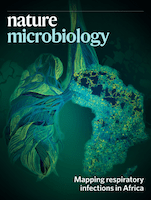
Nature Microbiology
Unveiling the Secrets of Microbial LifeNature Microbiology is a premier journal published by NATURE PORTFOLIO that has firmly established itself within the realms of microbiological research since its inception in 2016. Based in the United Kingdom, this prestigious journal specializes in the intricacies of applied microbiology, cell biology, genetics, immunology, and medical microbiology, making it a cornerstone for academics and professionals alike. With an impressive Scopus ranking placing it in the top tier across various relevant categories—such as rank #3 in Genetics and #2 in Applied Microbiology—it underscores the journal’s commitment to high-quality, impactful research. Although it operates under a subscription model, Nature Microbiology's broad Open Access policy facilitates greater dissemination and visibility for its authors. The journal's objectives are centered around publishing cutting-edge advancements that enhance our understanding of microbial life, its interactions, and applications in health and disease. As a Q1 journal across multiple disciplines, it holds immense significance for researchers, professionals, and students enthusiastic about the latest innovations and breakthroughs in microbiology.

MICROBIOLOGY
Advancing the Frontiers of Microbial ScienceMICROBIOLOGY (ISSN: 0026-2617, E-ISSN: 1608-3237), published by MAIK NAUKA/INTERPERIODICA/SPRINGER, is a pivotal journal in the field of microbiological research, operating from the vibrant hub of New York, United States. With a focus on the intricate relationships and functionalities of microorganisms, MICROBIOLOGY serves as an essential resource for professionals and researchers dedicated to advancing the knowledge of applied microbiology and biotechnology. As of 2023, it holds a competitive Q3 and Q4 category ranking in Applied Microbiology and Biotechnology and Microbiology, respectively, reflecting its commitment to high-quality and impactful research. Although currently not open access, the journal extends comprehensive insights into critical topics that span environmental microbiology, clinical applications, and biotechnology advancements, making it a vital platform for disseminating innovative findings in this ever-evolving discipline. Researchers and students alike will find MICROBIOLOGY to be an invaluable addition to their academic and professional repertoire.

TRENDS IN MICROBIOLOGY
Uncovering Trends that Transform Microbial UnderstandingTRENDS IN MICROBIOLOGY is a premier academic journal published by CELL PRESS, renowned for its high-impact research contributions in the fields of microbiology, infectious diseases, medical microbiology, and virology. With an impressive impact factor and a notable Scopus ranking—placing it in the top tiers of its categories, including a remarkable Q1 status in multiple disciplines—this journal is essential for researchers, professionals, and students aiming to stay at the forefront of innovative microbial research and ongoing advancements in pathogen biology. Since its inception in 1993, TRENDS IN MICROBIOLOGY has provided a platform for thought-provoking reviews and critical insights, fostering discussions that shape the future of the microbiological sciences. Based in the United Kingdom, TRENDS IN MICROBIOLOGY continues to lead the way in disseminating vital knowledge within the global scientific community.
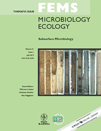
FEMS MICROBIOLOGY ECOLOGY
Advancing Knowledge in Microbial Ecology and SustainabilityFEMS Microbiology Ecology is a prestigious journal published by Oxford University Press, specializing in the dynamic field of microbiology and its ecological implications. With an impressive impact factor and consistently ranked in the top quartiles (Q1) across multiple categories—including Applied Microbiology and Biotechnology, Ecology, and Microbiology—this journal serves as an essential resource for researchers and professionals aiming to advance their understanding of microbial interactions within ecosystems. Established in 1990 and spanning to 2024, FEMS Microbiology Ecology delivers cutting-edge research, reviews, and insightful discussions that illuminate the complex roles microorganisms play in environmental health and sustainability. Located in the United Kingdom, this journal provides a global platform for discourse, making significant contributions to both theoretical frameworks and practical applications in the biotech and environmental science sectors. Researchers and students alike will find a wealth of information that not only enriches their knowledge but also inspires innovative solutions for ecological challenges.

ANNALS OF MICROBIOLOGY
Fostering collaboration in cutting-edge microbiological research.ANNALS OF MICROBIOLOGY is a prestigious journal dedicated to advancing the field of microbiological research, published by BMC, renowned for its commitment to providing open access to vital scientific findings. With its ISSN 1590-4261 and E-ISSN 1869-2044, this journal provides a platform for the dissemination of high-quality research since its inception in 1997. Renowned for its rigorous peer-review process, it has attained a commendable Q2 ranking in the Applied Microbiology and Biotechnology category in 2023, reflecting its significant contributions to the discipline. Positioned within the 67th percentile among its peers in Scopus rankings, ANNALS OF MICROBIOLOGY continues to facilitate the exchange of innovative ideas and methodologies, serving as an essential resource for researchers, professionals, and students alike. The journal covers a broad spectrum of topics, emphasizing the intersection of microbiology with applied sciences, thereby fostering an environment that encourages collaboration and advancement in this vital field. Scholars seeking to stay at the forefront of microbiological studies will find ANNALS OF MICROBIOLOGY an invaluable addition to their academic pursuits.